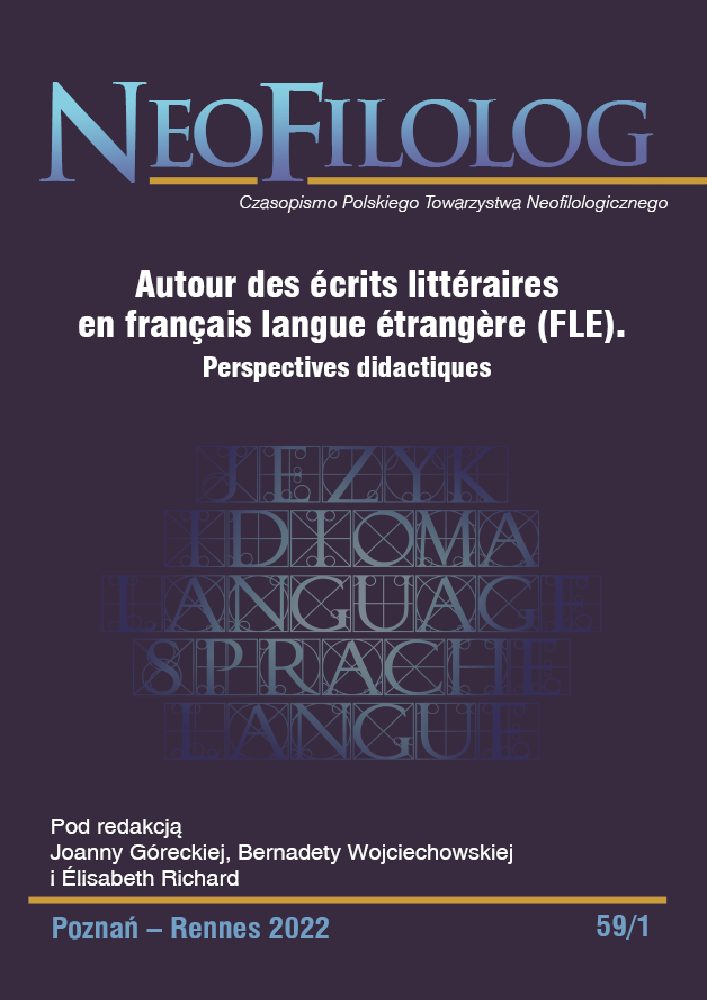Abstract
The purpose of this article is to examine the issue of interculturality in contemporary Francophone literatures in the language classroom. As a tool of a humanist and intercultural education, the purpose of which is based on the awareness of cultural diversity and dialogue with the alterity, the literary text thus becomes a mediator in the development of intercultural competence. To illustrate this hypothesis, three texts will serve as a reference for this purpose: Dans le ventre du Congo (2021) by Blaise Ndala which tells the story of the conflictual relationship between Belgium and the colonized Congo; Les Impatientes (2020) by Djaili Amadou Amal which evokes the problem of violence against Cameroonian women, while La dynastie des boiteux. Zoonomia (2018) by Bessora deals with the figure of a Reunionese naturalist explorer of colonized Africa.
Funding
Francophone contemporary literature
intercultural competence
French as a Foreign Language (FFL)
References
Members may also deposit reference lists here too.
Abdallah-Pretceille M., Porcher L. (1996), Éducation et communication intercul-turelle. Paris : PUF.
Albert M.-C., Souchon M. (2000), Les Textes littéraires en classe de langue. Paris : Hachette FLE.
Amadou Amal D. (2020), Les Impatientes. Paris : Collas.
Bakešová V. (2020), La littérature, outil toujours actuel dans l'enseignement de FLE. « Romanistica Comeniana », n° 2, 63-76.
Barrett M., Byram M., Lázár I., Mompoint-Gaillard P., Philippou S., (2014), De-veloping intercultural competence through education. Strasbourg: Coun-cil of Europe
Beacco J.-C. (2017), L'altérité en classe de langue. Pour une méthodologie édu-cative. Paris : Didier.
Berthelot R. (2011), Littératures francophones en classe de FLE : pourquoi et comment les enseigner ? Paris : L'Harmattan.
Bessora (2018), La dynastie des boiteux. Zoonomia. Paris : Le serpent à plumes.
Byram M. (2008), From foreign language education to education for intercul-tural citizenship. Essays and reflections. Clevedon: Multilingual Matters. https://doi.org/10.21832/9781847690807
Conseil de l'Europe (2001), Cadre européen commun de référence pour les langues : apprendre, enseigner, évaluer. Paris : Didier.
Conseil de l'Europe (2021), Cadre européen commun de référence pour les langues : apprendre, enseigner, évaluer. Volume complémentaire. Stras-burg : Éditions du Conseil de l'Europe.
Cuq J.-P., Gruca I. (2005), Cours de didactique du français langue étrangère et seconde. Grenoble : PUG.
Defays J.-M. (2018), Enseigner le français langue étrangère et seconde. Ap-proche humaniste de la didactique des langues et des cultures. Bruxelles : Éditions Mardaga.
Defays J.-M., Delbart A.-R., Hammami S., Saenen F. (2014), La littérature en FLE : état des lieux et nouvelles perspectives. Paris : Hachette FLE.
Dolz J., Gagnon R. (2017), Didactique des langues, (in :) van Zanten, A., Rayou, P. (dir.), Dictionnaire de l'éducation. 2e édition. Paris : Presses Universitaires de France, 183-187.
Dufays J.-L. (2006), La lecture littéraire, des « pratiques du terrain » aux mo-dèles théoriques, « Lidil », no 33, 79-101. En ligne : https://doi.org/10.4000/lidil.60 [consulté 07 mars 2022].
Fraisse E. (2012), L'enseignement de la littérature : un monde à explorer. « Revue internationale d'éducation de Sèvres », n° 61. En ligne : https://doi.org/10.4000/ries.2664 [consulté 15.12. 2021].
Godard A. (dir.) (2015), La littérature dans l'enseignement du FLE. Paris : Didier.
Husti-Laboye C. (2010), La Diaspora postcoloniale en France, Différence et di-versité. Limoges : Pulim.
Larrivé V. (2017), Empathie fictionnelle et théories de la fiction, quelles implica-tions en didactique de la littérature, (in :) Le Goff F., Fourtanier M.-J. (dir.), Les Formes plurielles des écritures de la réception. Volume 1 : Genres, espaces, formes. Namur : Presses Universitaires de Namur, 55-72.
Malela B. (2019), La Réinvention de l'écrivain francophone contemporain. Paris : Éditions du Cerf, coll. « Cerf Patrimoines ».
Morel A.-S. (2012), Littérature et FLE : état des lieux, nouveaux enjeux et pers-pectives. « Synergies Monde », n° 9, 141-148. En ligne : http://gerflint.fr/Base/Monde9/morel.pdf [consulté 07.03.22].
Mouralis B. (2007), L'Illusion de l'altérité. Études de littérature africaine. Paris : Honoré Champion.
Ndala B. (2021), Dans le ventre du Congo. Paris : Mémoire d'encrier.
Półtorak E., Krajka J. (2018), E-learning w kształceniu kompetencji międzykultu-rowych na poziomie uniwersyteckim - w stronę kodeksu dobrej praktyki. « Neofilolog » no 46/2, 199-219. En ligne : https://doi.org/10.14746/n.2016.46.2.05 [consulté 06.03.22].
Puren Ch. (2014), Textes littéraires et logiques documentaires en didactique des langues-cultures. « Le langage et l'homme », n° XLIX.1, 127-137. En ligne : https://www.christianpuren.com/mes-travaux/2014g/ [consulté 07.03.22].
Sperkova P. (2009), La littérature et l'interculturalité en classe de langue. « Sens public ». En ligne : https://doi.org/10.7202/1064224ar [consulté 07.03.22].
License
Copyright (c) 2022 Neofilolog

This work is licensed under a Creative Commons Attribution-NoDerivatives 4.0 International License.
Authors
Authors of texts accepted for publication in Neofilolog are required to complete, sign and return to the Editorial team’s office the Agreement for granting a royalty-free license to works with a commitment to grant a CC sub-license.
Under the agreement, the authors of the texts published in Neofilolog grant Adam Mickiewicz University in Poznań a non-exclusive, royalty-free license and authorize the use of Attribution-NoDerivatives 4.0 International (CC BY-ND 4.0) Creative Commons sub-license.
The authors retain the right to the free disposal of the work.
Users
Interested Internet users are entitled to use works that have been published in Neofilolog since 2017, under the following conditions:
▪ attribution – obligation to provide, together with the distributed work, information about the authorship, title, source (link to the original work, DOI) and the license itself.
▪ no derivatives – the work must be preserved in its original form. Without the author's consent, it is not possible to distribute the modified work in the form of translations, publications, etc.
Copyrights are reserved for all texts published since 2017.
Miscellaneous
Adam Mickiewicz University in Poznań retains the property right as a whole (layout, graphic form, title, cover design, logo etc.).

